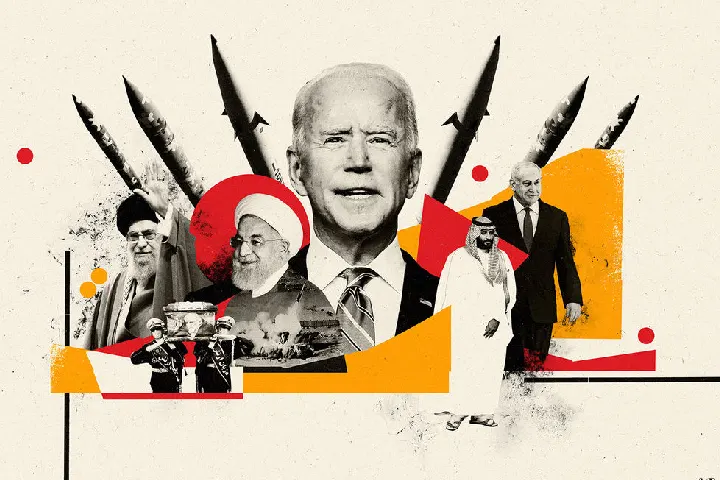

Proponents of the deal said that it would help prevent a revival of Iran’s nuclear weapons program and thereby reduce the prospects for conflict between Iran and its regional rivals
Two unachieved Middle East breakthroughs are said to be take-off points for US President Joe Biden’s 2024 rerun campaign: renewed nuclear deal with Iran and Israel-Saudi Arabia normalisation. The latter, despite being least negotiated, has become such a buzz that it seems imminent going by the enthusiasm shown by a section of the media. The former, almost at final stage, is not coming through and has even got subdued media coverage.
The Iran nuclear agreement, formally known as the Joint Comprehensive Plan of Action (JCPOA), is a landmark accord reached between Iran and several world powers, including the United States, in July 2015. Under its terms, Iran agreed to dismantle much of its nuclear program and open its facilities to more extensive international inspections in exchange for billions of dollars’ worth of sanctions relief.
Proponents of the deal said that it would help prevent a revival of Iran’s nuclear weapons program and thereby reduce the prospects for conflict between Iran and its regional rivals, including Israel and Saudi Arabia. However, the deal has been in jeopardy since President Donald Trump withdrew the US from it in 2018. In retaliation for the US departure and for deadly attacks on prominent Iranians in 2020, including one by the US, Iran has resumed its nuclear activities.
When President Biden took over White House, he in 2021 restarted negotiations with the US — mediated by the European Union and attended by signatories.
Reduced Uranium Enrichment
According to UN nuclear watchdog reports seen by Reuters, Iran has reduced the rate at which it is making uranium enriched up to 60% purity, close to the roughly 90% that is weapons grade, and has diluted a small fraction of its 60% stockpile.
Nonproliferation analysts say Iran’s nuclear slowdown may be enough for the United States and Iran to keep exploring what they describe as “understandings” — which Washington has never acknowledged — to lower tensions over nuclear and other issues.
“The slowdown of the 60% accumulation is a clear sign Tehran is open to advancing the de-escalatory ‘understandings’ with Washington,” said Henry Rome of the Washington Institute for Near East Policy.
Rome said the slowdown and US-Iranian prisoner exchange in September set the stage for additional diplomacy this fall around the nuclear program, albeit without the goal of reaching a new deal until after the US presidential elections.
“For Washington, there is probably a low bar for what Iran needed to do for the purposes of de-escalation,” he added. “Iran has likely crossed that bar.”
Asked why Iran slowed its program, a Western diplomat told Reuters: “I think that’s part of discussions that they’ve been having with the US and it is part of the wider deal, the non-deal deal.”
Breakdown of Breakthrough, and Revival
With a lot of ups and downs in 2022, there were numerous reports of near breakdowns and imminent deals throughout last year.
By September, a final text was hammered out based on a European offer, but ultimately fell through with Iran and the West accusing each other of not being serious enough to cross the finish line.
A deadlock, which has been accompanied by significant developments inside and outside Iran, has since persisted.
Western parties have imposed multiple rounds of sanctions on senior Iranian officials and entities for allegedly supplying Russia with drones for the war in Ukraine. Tehran says it opposes war and had sold drones to Moscow months before the war.
Mass protests spread across Iran after the September death of 22-year-old woman Mahsa Amini in police custody. Iran accused the West of organising the unrest and the West imposed many rounds of human rights sanctions to punish Tehran’s response to the protests.
Publicly, the US has expressed little interest in returning to the table. But it has repeatedly touted diplomacy as its preferred option for keeping Iran from nuclear weapons capabilities, and it recently negotiated a prisoner swap with Tehran that included unfreezing some $6 billion in Iranian money. It is seen as the first major US diplomatic step towards restoration of the nuclear deal.
But to make any solid headway in on the N-deal front, President Biden will have to win over the powerful Jewish lobby in the US and Benjamin Netanyahu-led Israeli government that are major impediments in achieving nuclear deal and lifting of sanctions against Iran. However, if negotiations between Riyadh and Tel Aviv adjust the Iranian question, then both the deal could see prospects of seeing the light of the day.
Meanwhile, in a major indication towards revival of serious nuclear talks, UK-based Amwaj.media reported last week that Iran wants to resuscitate negotiations over bringing the US back into the 2015 Joint Comprehensive Plan of Action where they were when they fell apart about a year ago.
Citing senior Iranian sources, Amwaj reported that Iranian Supreme Leader Ayatollah Ali Khamenei had “granted permission” for direct nuclear talks between Iran and the US.
Also Read: Why Biden’s patch up bid between Saudi-Arabia and Israel may become a flop show
The Indian Chamber of Commerce (ICC) on Thursday hosted the 14th India Minerals and Metals…
Prime Minister Narendra Modi departed from Ghana's capital city of Accra after concluding the first…
India and Australia have undertaken the first science and technology project arrangement to improve the…
The eighth edition of India-France Joint Military Exercise Shakti-VIII concluded on Thursday at Camp Larzac,…
As Prime Minister Narendra Modi has been conferred the national honour of Ghana, Officer of…
External Affairs Minister S Jaishankar held a meeting with FBI Director Kash Patel in Washington…